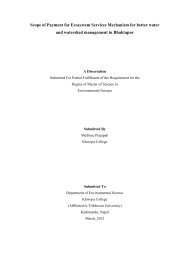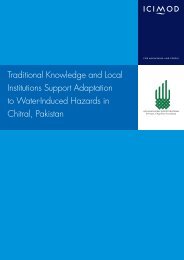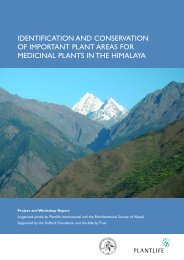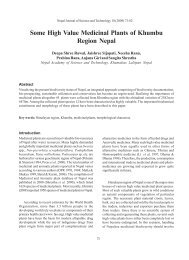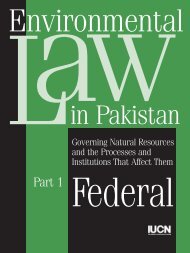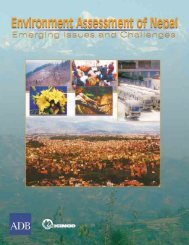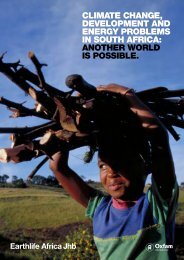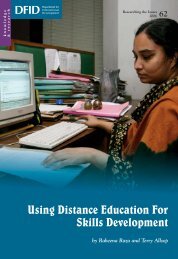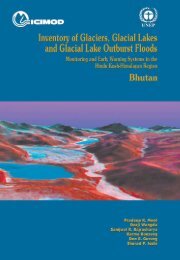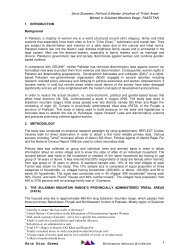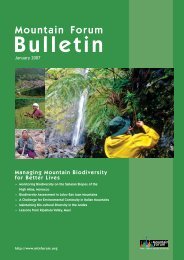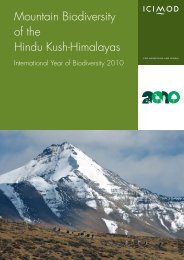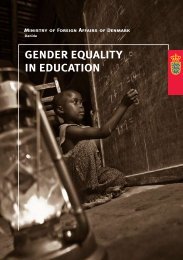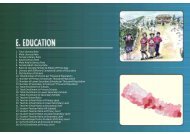Flash Flood Risk Management â A Training of Trainers ... - ReliefWeb
Flash Flood Risk Management â A Training of Trainers ... - ReliefWeb
Flash Flood Risk Management â A Training of Trainers ... - ReliefWeb
Create successful ePaper yourself
Turn your PDF publications into a flip-book with our unique Google optimized e-Paper software.
Day 2<br />
The CFFRMC also plays a role in training women to deal with disease control, malnutrition, food shortages,<br />
land treatment, and crop production. Adopting a gender perspective would advocate that the roles <strong>of</strong> men<br />
and women be examined separately and that strategies for protection and mitigation be targeted specifically<br />
at men and women based on their roles.<br />
For the most part, women in the HKH region have lower literacy and educational levels than men; this<br />
has also contributed to their reduced access to post-disaster relief activities. Moreover, the lack <strong>of</strong> gender<br />
awareness in communications at the grassroots level means that women have had limited access to disasterrelated<br />
information. It is important to bring gender issues to the fore when addressing capacity building<br />
and empowerment initiatives. The knowledge and skills gained for general preparedness are also useful in<br />
emergencies.<br />
Women face specific problems during disasters. One recurring problem is the lack <strong>of</strong> privacy; in situations <strong>of</strong><br />
prolonged water logging, the simple activity <strong>of</strong> bathing and tending to personal hygiene in relative privacy<br />
is more problematic for women than it is for men. Women are also more restricted in their mobility than men,<br />
as they are usually the ones responsible for the care <strong>of</strong> young children and the elderly. Women and girls <strong>of</strong><br />
all ages are commonly harassed during disasters. Not only are the womenfolk commonly forgotten when<br />
information is disseminated, but they have the added burden <strong>of</strong> also being the ones tasked with collecting<br />
relief materials.<br />
Session 8<br />
Women, the poor, and the more underprivileged segments <strong>of</strong> society have specific issues when it comes to<br />
combating disaster, but they can also bring a unique perspective which can be invaluable in saving lives<br />
and property, especially at the family level. For this reason it is necessary to keep the following points in<br />
mind when conducting gender-based risk management, as women can introduce innovative mechanisms and<br />
techniques.<br />
• Remember to differentiate between different target groups and specific objectives and approaches for all<br />
intervention activities.<br />
• Involve women in pre- and post-disaster management.<br />
• When planning activities remember that women have particular needs with respect to security, hygiene,<br />
and related issues.<br />
• Ensure girls’ education after disaster.<br />
• Protect the specific health needs <strong>of</strong> women.<br />
• Help women become self-sufficient in terms <strong>of</strong> minimum income and financial security.<br />
• Ensure equitable aid distribution.<br />
• See that women can partake in the decision-making process by providing the capacity building and<br />
advocacy training that they need to be able to participate fully.<br />
55



